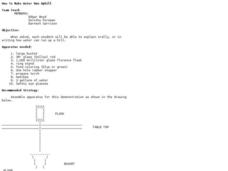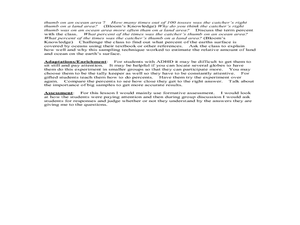Curated OER
Floods
Students explore Earth science by answering study questions on-line. In this natural disasters lesson, students research Australia flood statistics over the past 40 years and identify patterns. Students utilize the web to view...
Curated OER
What Can We Do To Change These Materials
First graders perform experiments to investigate property changes that occur in materials or matter. In the science lab, they use heat to explore changes in rice, sand, gelatin, baking soda and more. Learners observe and record the...
Curated OER
How to Make Water Run Uphill
Students observe science demonstration. In this science lesson, students watch an experiment showing water moving up from an area of higher concentration to an area of lower concentration, due to a change in atmospheric pressure.
Curated OER
Wood
Students practice reading comprehension strategies. In this literacy and science activity, students read a non-fiction article about wood and locate main ideas and details. Students construct a card game using information taken from the...
Curated OER
What Part of the Earth's Surface is Covered by Oceans?
Third graders investigate oceans. In this Earth science instructional activity, 3rd graders predict how much of the Earth's surface is covered by oceans. Students determine if their predictions are accurate by throwing a globe to each...
Curated OER
Space Adventure
Students demonstrate comprehension skills, including reading strategies, inference, literal meaning, and critical analysis.
Curated OER
Recycling
Fourth graders gain an awareness of recycling. In this science lesson plan, 4th graders become aware of how much garbage we can produce, identify landfills and their purposes, and explain how recycling saves energy and resources while...
Curated OER
Cells Are Us
Students explore cells. In this science lesson plan, students investigate how the cell is the basic unit of life, that cells divide slowly to become mass of cells, and that there is a gradual loss of cells throughout life.
Curated OER
Food For Energy - Four Food Groups
Students consider how food is converted to energy. In this science lesson plan, students explore the importance of eating properly with a balanced diet as they study 4 food groups.
Curated OER
Potential Consequences of Climate Variability and Change
Students examine the potential impact of climate change to agriculture, coastal areas, forests, water, and human health. They hypothesize what might happen to a sugar maple forest and hold a debate about global warming.
Curated OER
Brainstorming and Creating a Graphic Organizer Using Kidspiration
Although focused on the winter ecology at Crater Lake, this lesson could be tweaked to use as a exploration of any region. After a visit to Crater Lake, learners discuss topics relating to winter in this area, such as the behavior of...
Curated OER
Animal Keynote Report
Learners produce a research project on an animal. Using the Internet, they find pictures and information about animals. They are also given a list of items that should be covered in their report, including the appearance of the animals,...
Curated OER
Science Experiments with Eggs
ESL students experiment with eggs to learn the science concepts and science process language.
Curated OER
Artha: Strategies for Survival, Success, and Power
High schoolers explain the concept of artha, recognize strategies that allow states to survive and see how elements useful in political science can be applied to getting ahead in everyday life.
Curated OER
Science: Plate Tectonics, Faults, and Volcanoes
Eighth graders conduct Internet research on plate tectonics, faluts, and volcanoes. In groups, they compile information related to teacher-provided questions. Students write papers detailing their findings and make oral presentations...
Curated OER
A Scientific Approach to Teaching about Evolution
Middle schoolers examine fossils and analyzing their significance in relation to theories of evolution. Hand-outs are provided. This lesson could be supplementary to a broader unit on evolution or geology.
Curated OER
Show Some Backbone and Teach Invertebrates
Fifth graders identify two similarities and two differences between two phyla, assign fictitious invertebrate to its phylum and explain why it belongs in that grouping, and construct member of given phylum and explain why it should be...
Curated OER
Circulatory System: The Beat Goes On!
With schools focusing on physical fitness activities, now is the perfect time to teach students about the circulatory system.
Curated OER
Paper Towel Testing
Students discuss whether there are variations in absorbency and wet strength amount different brands of paper towels. They compare advertising claims and personal preferences and perform tests to reach a conclusion of which brand is the...
Curated OER
Aquaculture: Down on the Salmon Farm
Students examine the problems of the continued development of aquaculture. They also brainstorm ideas that people in this field would need to be successful.
Curated OER
Sink or Float
Second graders explore floating and sinking and make predictions about whether certain objects are likely to sink or float. They read the story Who Sank the Boat? by Pamela Allen. Pupils loacate rhyming words and discuss the events of...
Curated OER
Hamlet Research Paper: Find, Evaluate, and Select Appropriate Research Sources
Help young researchers find credible sources online. Modeling with a Google search for information about Shakespeare’s Macbeth, use a computer projector or Smart Board to show class members how weak the top three search results are....
Curated OER
Can Young Children Distinguish Between Living and Non-living Things?
What does it mean to be living? Help your young scientists identify living and non-living things as a result of their learning through discovery. Observation of and interaction with a set of natural phenomena in their community will make...
NOAA
A Quest for Anomalies
Sometimes scientists learn more from unexpected findings than from routine analysis! Junior oceanographers dive deep to explore hydrothermal vent communities in the fourth lesson in a series of five. Scholars examine data and look for...

























